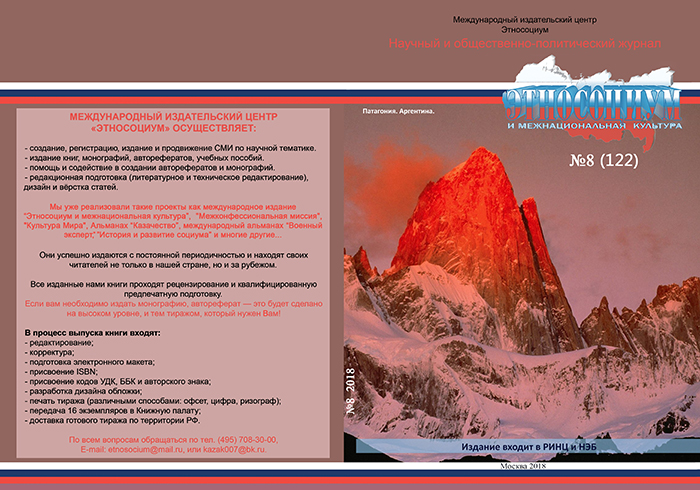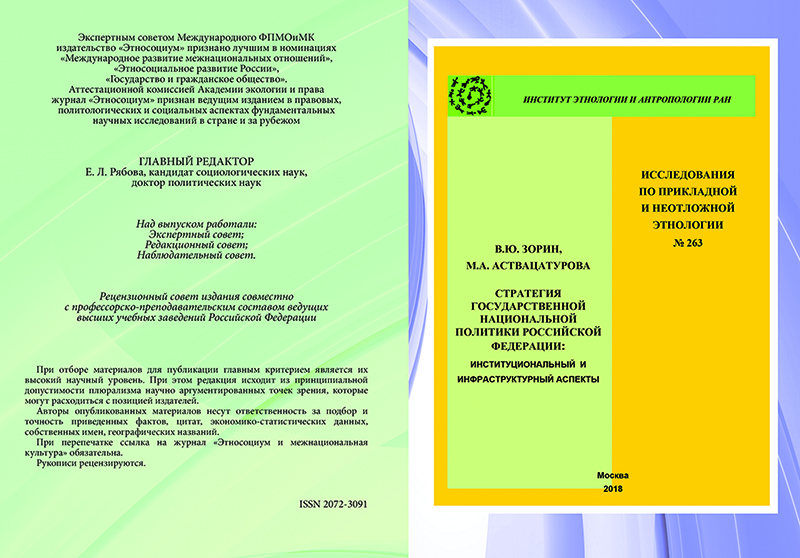

Content
|
COUNCIL OF INTERNATIONAL RELATIONSHIP
|
|
|
Kovrigina G.D. National Integration Tools
|
11
|
|
ACTUAL PROBLEMS OF MODERN SOCIETY:
POLITICS, ECONOMICS, LAW
|
|
|
Avdeev V.S. Digital economy
|
20
|
|
Mikhailova N.V., Iglin D.А., Grishin O.E. Interrelation of mass culture and video games industry: political and philosophical aspect
|
25
|
|
Dolgenko A.N., Murashko S.F., Rydakova S.V. Peculiarities of teaching translation as a complex type of speech activity in a non-linguistic university
|
34
|
|
Zemcov B.N., Suzdaleva T.R. University rankings: development vectors
|
38
|
|
Fotina L.V., Borshchevskiy G.A. Methodology of estimation of state management and state service in the Russian fuel and energy complex
|
48
|
|
REGIONAL STUDY:
POLITICS, ECONOMICS, LAW
|
|
|
Shchuplenkov N.O., Shchuplenkov O.V. Modern approaches to understanding historical truth and objectivity
|
58
|
|
Babkov D.I. The problem of realization of the rights of former law enforcement officers on payment of temporary incapacity
|
68
|
|
Kolesnik I.A. Prerequisites for the revival of the All-Russian physical culture and sports complex «ready for labor and defense» in Sevastopol
|
76
|
|
INTERNATIONAL RELATIONSHIPS:
POLITICS, ECONOMICS, LAW
|
|
|
Sadi Saidash Sayin-oolovich The Constitution as one of the dominants of the evolution of the regional political process in Tuva
|
84
|
|
Biryukov S.V. Donald Trump can make America great again? (about the possibility of a revision of the American economic strategy)
|
89
|
|
Beyshenaliev A.B. Strategy of USA in post-soviet Central Asia
|
100
|
|
Otcheskaya N.V. Theoretical-methodological bases of the study of the transformation of the political system in Argentina
|
115
|
|
Abstracts
|
119
|
|
Authors
|
130
|
|
Requirements to materials submitted to the international publishing house "Etnosocium"
|
133
|
The article discusses the tools of national integration through the functioning of diasporas in various regions of Russia. The article presents the results of an expert study conducted in 2017 in ten regions of the Russian Federation, within the framework of which the affective, cognitive and activity conditions of sociocultural solidarity of members of national centers and diasporas in the regions under consideration were identified. The areas that can become an occasion, a tool and at the same time a resource for the formation of socio-cultural integration were considered in detail.
Keywords: diasporas, sociocultural integration, migrants, regions of Russia, Siberia, the Far East.
Currently, there are tendencies to increase the potential for the development of the information technology sector in Russia and the growth prospects for the export of IT products from the country, which necessitates the formation of a digital economy aimed at improving the efficiency of all sectors of the national economy through the use of information technologies. Therefore, in 2017, the Government of the Russian Federation developed and approved a program to create conditions for the country's transition to a digital economy, entrusting the coordination of the participation of expert and business communities in the implementation planning, development and evaluation of the effectiveness of the Digital Economy program created by successful Russian high-tech companies. The program provides for the formation of legal, technical, organizational and financial conditions conducive to the development of the digital economy in the Russian Federation and its further integration into the digital economy space of the member states of the Eurasian Economic Union. One of the areas of the program is to improve the education system to provide the digital economy with competent personnel.
Keywords: information technologies, digital economy, improvement of the education system, staffing.
As an element of the mass culture of video games are very popular, they are interested in different segments of the population. They interact with many people, which makes them an important object of study by the political science community. Their potential is poorly understood in the context of mass culture.
Keywords: politics, culture, mass culture, elite culture, video games, game industry.
The article covers the issues related to the linguistic training of students in the intercultural communication space, as well as the difficulties encountered when translating terms in legal texts from English into Russian.
Keywords: intercultural communication, professional communication, linguistic personality, communicative competence, conceptual picture of the world, translation skills, preparation of students.
Article is devoted to a problem of ranging of the universities in the context of their internationalization, assessment of validity of the international indicators. The attention is focused on shortcomings of rating systems, difficulties of their use of assessment of the higher education of Russia.
Without denying value of global ratings in increase in competitiveness of Russian education, authors emphasize that indicators of world ranging aren't always reflected by versatility of educational process.
The main number of domestic higher education institutions can use the international ratings only as the general reference point as the universities of Russia and the West exist in different realities and historical traditions. For the Russian system of the higher education national ratings which develop domestic rating agencies are more acceptable.
Keywords: ratings, universities, the higher education, citing.
The purpose of the article is to assess trends in the public policy in the fuel and energy complex of Russia (F&E) in comparison with the development of civil service in this sphere. We use the factor analysis, the statistical methods, and the historical and comparative method to trace the long-term trends in the development of the F&E and the civil service. Also we collected an empirical data describing the development of the F&E and civil service in the period since the crisis of the socialism in the mid-1980s up to the present time. We proposed indices for estimating the development of the F&E and the civil service based on statistical data. The statistical congruity was confirmed between the development of the F&E and the civil service that manages this sector. The civil service itself does not increase or decline the sectorial development, but the situation of poor consistency of these processes, as a rule, has negative consequences. For the period under study, civil service development indexes deteriorated, and the F&E development indexes increased. The civil service development is lags behind the pace of the F&E development, and it is necessary to continue reforming this field. We proposed some measures to optimize the functional load of the F&E ruling bodies, and introduce an assessment of the civil ser-vice in terms of the managed sector development, as it needs to overcome the isolation from processes in the real sector.
Keywords: fuel and energy complex, power engineering, fuel industry, nuclear industry, public administration, civil service, public program.
The article attempts to clarify the current trends in epistemology concerning the problems of definition and objectivity in historical knowledge. Various approaches have been studied, on the one hand, recognizing the complete similarity of historical truth with truth in the natural sciences and, on the other hand, the total denial of historical truth and objectivity in the traditions of postmodernism, the replacement of these concepts by the concept of "novelty".
Keywords: historical truth, historical objectivity, historical factuality, historical philosophy, postmodernism.
Social protection System in the Russian Federation includes the right to receive benefits for the period of temporary disability. Special rules define the circle of persons entitled to receive this benefit and its calculation rules. This benefit is tied to the system of mandatory medical insurance and to pay insurance contributions to the Federal Fund of obligatory medical insurance (FOMS). But the number of Russian citizens included in the other insurance system and is legally not obliged to pay contributions to the HIF. Speech, in particular, is about the law enforcement officials. After the service, this category of citizens is faced with the problem of realization of its right to payment of temporary incapacity to put them theoretically, because it revealed a serious gap in this matter.
Keywords: social protection, labour law, compulsory insurance, temporary disability benefits, law enforcement officials.
This article examines the historical issues of the formation and improvement of the complex "Ready for Labor and Defense" as a means of implementing the state program of physical education. Identifies positive and negative aspects of implementation in practice, as well as peculiarities of functioning of the complex on the territory of Sevastopol.
Keywords: complex "GTO", history, physical culture, sport, tests, population.
The article is devoted to the consideration of political processes in the Republic of Tuva from the early 1990s to the present in the prism of changes in the Basic Law of the region - the Constitution. The analysis of changes in the political sphere of society at the present stage has been carried out. Regulatory legal acts, peculiarities of functioning of state power institutions of the region are studied.
Keywords: Russian Federation, Republic of Tuva, constitution, political process, region, federal center, sovereignty, government, power.
The article considers the economic strategy of the administration of Donald trump in the context of the struggle for increasing the "global competitiveness" of the United States and the preservation of their status as a Great Power. The author links this issue with the need to revise the neoliberal socio-economic policy implemented in the United States since 1978, when the process of "ascent of corporatocracy" began and the foundation of the modern large-scale social stratification was laid. As the author believes only on this way can be realized the "conservative revival" of the country, declared by D. Trump and linked with the preservation by the United States of the status of one of the leading World Powers.
Keywords: World Power, global competitiveness, neoliberalism, social policy, middle class, corporatocracy.
The author reflects the essence of strategic goals and tasks of the USA, which are aimed at Central Asia - Kazakhstan, Kyrgyzstan, Tajikistan, Turkmenistan and Uzbekistan. American policy in the region is conducted within the framework of "new order" using tactics of "managed chaos". In the 21st century, the US began to implement a project "Greater Central Asia" aiming to expand the understanding of Central Asia, including northern India, western part of China and Afghanistan. The United States views the region as an influential partner in the fight against international terrorism, but also as an "element of Russia's weakening" and "a deterrent to China." In addition, they have fears of the rapprochement of Iran with Central Asia.
Keywords: controlled chaos, Big (Large) Central Asia, Great the Grand Chessboard, post-soviet region, transit center, island of democracy.
The article analyses the theoretical-methodological bases of the study of the transformation of the Argentinian political system. It is noted that during the process of transition from authoritarian regime to democracy, deviation from the final result and the emergence of hybrid forms of democracy is possible. The model of "delegative democracy" proposed by the Argentine researcher G. O'Donnell is briefly analyzed. Some theories of the influence of internal and external factors are applied to Argentina.
Keywords: theoretical-methodological, transformation, political regime, Argentina.